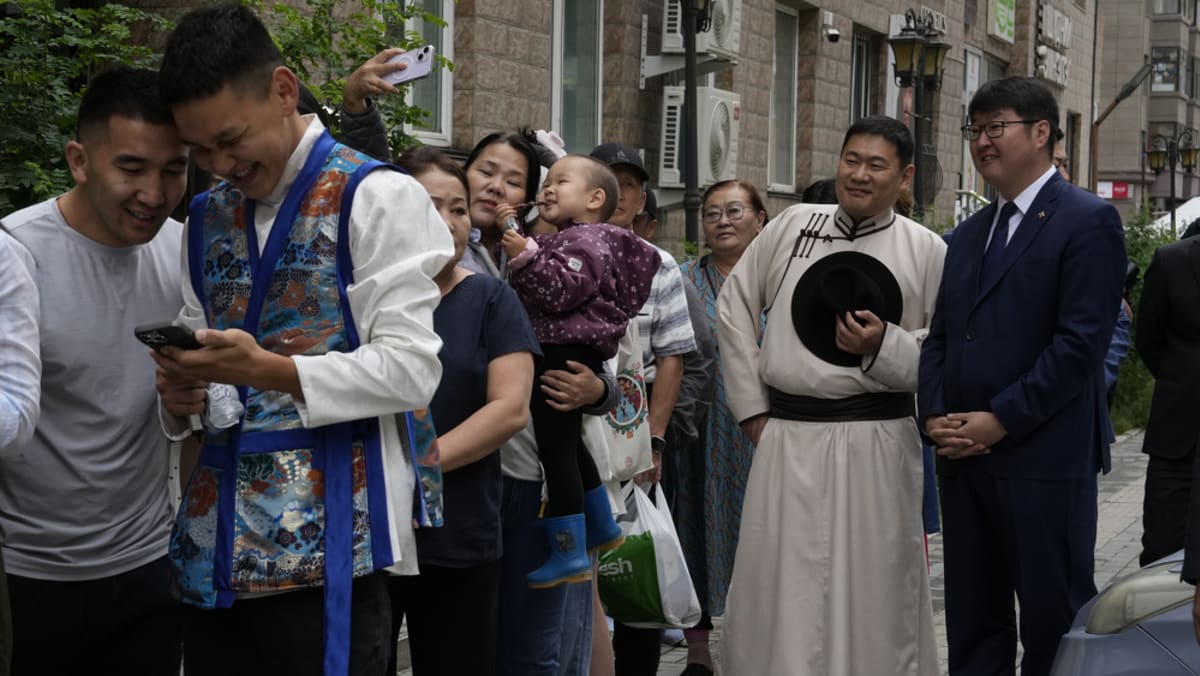ULAANBAATAR: Mongolians voted in parliamentary elections on Friday (Jun 28), with the ruling party widely expected to win despite deepening public anger over corruption and the state of the economy.
People across the vast, sparsely populated nation of 3.4 million, sandwiched between China and Russia, are voting to elect 126 members of the State Great Khural.
Polls opened at 7am local time and will close at 10 pm, with preliminary results expected later in the night.
Tsagaantsooj Dulamsuren, a 36-year-old cashier pregnant with her fourth child, told AFP that Friday’s poll offered her a chance to “give power to the candidates you really want to support”.
“I want lawmakers to provide more infrastructure development … and more jobs in the manufacturing industry for young people,” she said outside a polling station at a hospital near the capital Ulaanbaatar.
Analysts expect the ruling Mongolian People’s Party (MPP), led by Prime Minister Luvsannamsrain Oyun-Erdene, to retain the majority it has enjoyed since 2016 and govern the country for another four years.
The party can credit much of its success to a bonanza over the past decade in coal mining that fuelled double-digit growth and dramatically improved standards of living, as well as a formidable party machine and a weak, fractured opposition, they say.
Yet there is deep public frustration over endemic corruption, as well as the high cost of living and lack of opportunities for young people who make up almost two-thirds of the population.
There is also a widespread belief that the proceeds of the coal mining boom are being hoarded by a wealthy elite – a view that has sparked frequent protests.
BROAD SPECTRUM
Preliminary results are expected to come within a few hours of polls closing despite Mongolia’s vast size, thanks to assistance from automated vote counting.
The streets of Ulaanbaatar, home to almost half the population, have been decked out with colourful campaign posters touting candidates from across the political spectrum, from populist businessmen to nationalists, environmentalists and socialists.
Parties are required by law to ensure that 30 per cent of their candidates are women in a country where politics is dominated by men.
Long lines snaked around corridors at a polling station in a school in downtown Ulaanbaatar, with many wearing traditional clothing.
Prime Minister Oyun-Erdene also voted in the city at a kindergarten, an AFP reporter saw.
Speaking to local TV after casting his ballot, the prime minister said he hoped Friday’s vote would “open a new page of trust and cooperation between the state and citizens”.
YOUNG VOTERS UNIMPRESSED
Younger voters are largely not convinced by the ruling party’s pitch, however, and the failure of the main opposition Democratic Party to provide a credible alternative has fuelled the rise of minor parties.
The centre-right anti-corruption HUN party is expected to increase its parliamentary representation through its social-media savvy, professional candidates, who enjoy significant support among the urban middle class.
At a polling station in rural Sergelen, an administrative division over an hour’s drive from the capital, 45-year-old community leader Batsaikan Battseren said he was urging people to vote.
“Our area’s average participation is 60 per cent,” the former herder said, dressed in traditional Mongolian deel clothing.
But, he explained, “young people from 18 to 30 years old don’t go to vote.”
“In previous elections, I would usually bring the youngsters who have just turned 18 to let them vote, but I couldn’t (convince them) this year,” he said.
“SOCIAL CONTRACT”
Mongolia has plummeted in Transparency International’s Corruption Perceptions Index under Oyun-Erdene’s rule.
It has also fallen in press freedom rankings under the MPP, and campaigners say there has been a notable decline in the rule of law.
Some fear that should the ruling party retain its mandate for another term, the prime minister will tighten his grip on power and erode the democratic freedoms of ordinary Mongolians.
“I’ll describe this election as a referendum on … Prime Minister Oyun-Erdene and whether he will manage to get a mandate to rewrite Mongolia’s social contract,” Bayarlkhagva Munkhnaran, political analyst and former adviser on the National Security Council of Mongolia, told AFP.
“This social contract will be about turning Mongolia into a proper electoral autocracy whereas, 10 years ago, Mongolia used to be respected as a liberal democracy,” he said.
The MPP is the successor to the communist party that ruled Mongolia with an iron grip for almost 70 years.
Still, it remains popular, particularly among rural, older voters, and commands a sprawling, nationwide campaign apparatus.
Former president Tsakhiagiin Elbegdorj, who held office for the opposition Democratic Party from 2009 to 2017, hailed the start of the election on X on Friday morning, writing: “As the Mongolian saying goes, ‘It is better to live by your own choice than according to others’ choices.’
“Around 260 foreign observers and three dozen journalists are present. I hope for genuinely democratic and transparent elections.”
